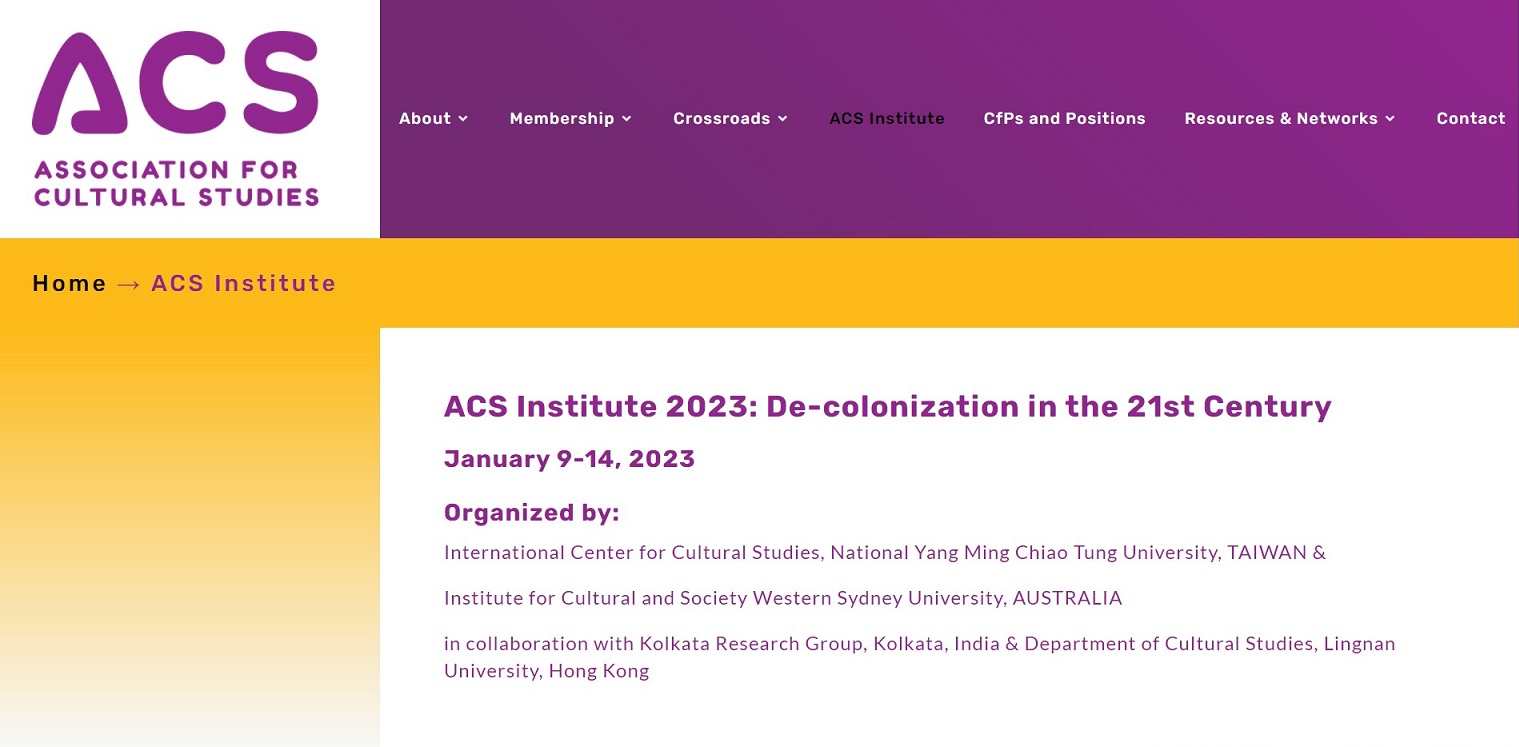

ACS Institute 2023: De-colonization in the 21st Century (January 9-14, 2023)
2022-02-23
ACS Institute 2023: De-colonization in the 21st Century
January 9-14, 2023
Organized by:
International Center for Cultural Studies, National Yang Ming Chiao Tung University, TAIWAN &
Institute for Cultural and Society Western Sydney University, AUSTRALIA
in collaboration with Kolkata Research Group, Kolkata, India & Department of Cultural Studies, Lingnan University, Hong Kong
De-colonization in the 21st Century (More information TBA)
The 2023 ACS Institute will discuss the question of decolonization in the 21st century. We face the drastic increase of international migration, stateless persons, the prolonged pandemic, extensive digital surveillance, extended platform economic, the precarity of temporary laborers on land and at sea, environmental crisis, and climate change. Along with these developing conditions, the intensified social inequality worldwide also escalates. We encourage scholars and students of cultural studies to re-think the project of decolonization in the 21st century. Today, colonialism indicates the colonial matrix of uneven power relations interwoven with various local/geopolitical structural factors. Under the systemic structure of colonial power relations, a part of the community/population/city becomes a colony/subalternate space. The project of decolonization in the 21st century, first and foremost, is to identify and analyze the colonial power relation that engineers and reproduces the unequal social relations and environmental injustice, disclose its historical formations, and challenge the fixations of institutional and ideological exclusions. We invite interdisciplinary critical analysis and innovative artistic projects to engage with the regeneration and experimentation of alternative forms of creative decolonization.
This ACS Institute will feature, but is not limited to, the following four interconnected dimensions:
I. Global Capitalism and Technologies of Governance: the transformation of global/local political economy and its impact on regional societies, the effects of China’s BRI, MSRI, and ARI on ASEAN, Central Asia, Africa and the global stage, logistical infrastructure, and technological governance, media empire, algorithmic automation, platform economy, digital surveillance, etc.
II. Marginalized Population, Stateless Persons, and Migrant Labors: border politics, the exclusive regime of citizenship, ethnic minorities and indigenous people, religious minorities, sexual and gender minorities, xenophobia, mobility and immobility, migrant labor, statelessness, temporary dispatch workers, instant delivery service, modern slavery, etc.
III. Environmental Justice/Injustice: ecological crisis, climate change, land deprivation, indigenous rights, animal protection, multi-species voices, etc.
IV. Social Engagement and Art Intervention: creative resistance through art, video, and music, new genre public art, screen documentary, alternative curation, sensory ethnography, documentary, participatory art, community solidarity, media ecology, media rights, filmmaking, exhibition, platform productions, virtual productions, software literacies, impact production, diaspora and migration. etc.
Hosted in Taiwan, as a nodal point linking Northeast Asia, Southeast Asia, South Asia, and other Asian countries, we want to foreground both geo-historical and geopolitical tensions in the global context. We will invite globally renowned scholars and highly respected in this region as our keynote speakers and seminar lecturers. The Institute will offer lectures, seminars, round tables, and workshops for participants to spend the week learning from one another and sharing their projects. Through this collaborative intellectual endeavor, we will address the tasks of decolonization in the 21st Century.
We welcome postgraduate students, postdoctoral researchers, and advanced scholars worldwide to share their ongoing projects with various disciplinary backgrounds: cultural studies, media and communication studies, critical legal studies, cultural sociology, literary studies, film studies, visual cultural studies, cultural anthropology, political philosophy are all welcome. In addition to theoretical interventions, we also encourage participants to contribute their experimental screen documentary, video thesis, audio-video ethnography, curatorial projects, and so on.

近期新聞 Recent News


